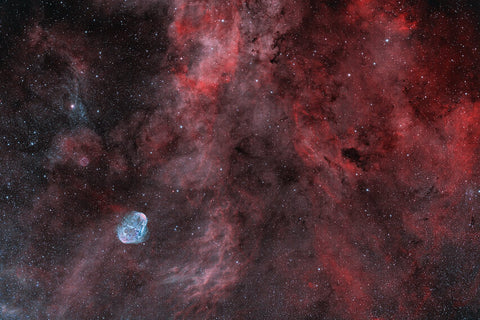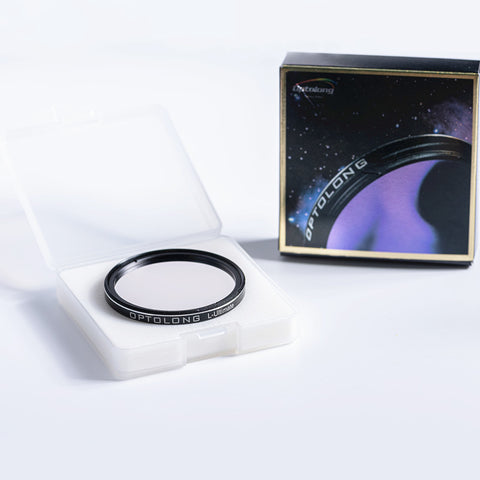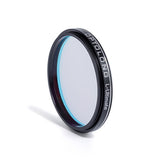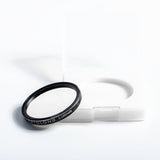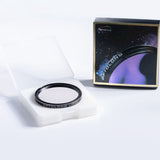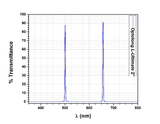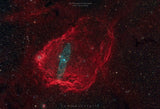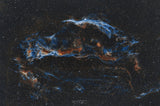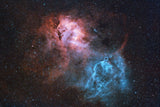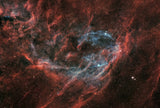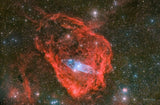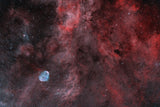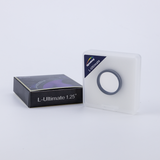![]() Qualifies for Free Ground Economy Shipping (CONUS Only)
Qualifies for Free Ground Economy Shipping (CONUS Only)
A 3nm dual band filter designed to drastically reduce the effect of light pollution. The 3nm bandpass isolates the nebulae emissions into H-Alpha (red) and OIII (green-blue). It blocks light pollution, maximizes the signal from nebulae, and darkens the sky background. It also blocks artificial light from mercury vapor lamps, high and low pressure sodium vapor lights, and unwanted natural light caused by the emission of neutral oxygen in our atmosphere.
Which to Choose?
- L-Pro provides the broadest spectrum and most natural color. Suitable for imaging nebula and galaxy targets.
- UHC is not as broad spectrum, less natural color, but will block more stray light and skyglow than the L-Pro. Best suited to nebula targets, not broad spectrum targets like galaxies or clusters.
- L-Enhance is a narrow tri-band filter. Best suited to capturing dim nebula targets. Will decrease brightness of surrounding stars, allowing for more faint detail.
- L-eXtreme is a dual-narrow-band 7nm filter providing a tight spectrum in only H-Alpha and OIII. Suitable for deep sky imaging under light polluted skies, and delivering the richest nebula detail.
- L-Ultimate is a dual-narrow-band filter, an enhanced version of the L-eXtreme with just a 3nm bandpass on both Ha and OIII.
If you plan to use the filter to image a wide range of targets, the L-Pro is the most versatile. The L-Ultimate will provide the most faint detail on emission nebula.
The L-Ultimate is different from the series of dual-narrowband L-eNhance and L-eXtreme in that L-Ultimate is a dual-3nm bandwidth filter that only passes through Ha and OIII emission lines. You will get a darker sky background, more contrast of the image and the suppression on stars. L-Ultimate has also been optimized in terms of halo performance, so that there is no obvious halo when shooting on a bright star object.
|
Subustrate |
optical glass |
|
Thickness |
1.85mm |
|
FWHM |
O3 3nm+Ha 3nm |
|
Blocking range |
>OD4 |
|
Surface quality |
60/40 |
|
Transmitted Wavefront RMS: |
λ/4 |
|
Parallelism |
30 seconds |
Package
- Plastic PP Case
- Imported High Pressure EVA Case Lining
- Silver Cardboard Box
Sizes
- Standard 2”
Nebulae Flying Bat and Squid in the constellation of Cepheus.
Squid (OU4) is a region characterized by very weak OIII emission with a bipolar shape reminiscent of planetary nebulae. Recent studies suggest that Ou4 is actually internal to SH2-129 (the H-alpha-emitting flying bat nebula, reddish in the image), generated by a triple star system located in the center (HR8119, visible as the bright star in the center of Squid).
The distance from our solar system is estimated at about 1300 light years.
The lights were taken over 2 years, with total integration equal to 29 hours (21.5 for OU4 and 7.5 for SH2-129).
This project gave me the opportunity to test the Omegon veTEC 571C camera and the Optolong L-Ultimate filter with excellent results for both products.
Lights: 258x300s (Ou4, L-Extreme) + 30x900s (Sh2-129, L-Ultimate)
Telescope1: Apocromatic TS PhotoLine 102 f/5,6 Triplet FPL53
Telescope2: Takahashi FS60CB @ f/4.2
Camera1: ZWO ASI 294mc Pro
Camera2: Omegon veTEC 571C
Mount: Skywatcher AZ-EQ6 GT
Filters: Optolong Astronomy Filter L-Extreme + L-Ultimate
Processing: DeepSkyStacker, Photoshop CC, PixInsight
Credit:Tommaso Massimo Stella (Italy)

Objects: Veil Nebula
Camera: QHY168C
Telescope: Pentax 100 SDUF II F/4
Mount: Skywatcher AZ-EQ5GT
Filter: Optolong 3nm L-Ultimate Filter
Frames: 13 x 240sec lights
Credit:Tommy Lim KW (Malaysia)

Sh2-132 The Lion nebula
Prosegue il test del filtro Ultimate della Optolong Astronomy Filter
96 light da 300 sec
No dark no flat
Credit:Andrea Maggi

Supernova remnant W63
Supernova remnant W63 glows like a faint cosmic smoke ring along the plane of the Milky Way toward the northern constellation Cygnus. Its spectral appearance is reflected in the region's rich complex of interstellar clouds and dust by an eerie blue glow, captured with Optolong's new dual band 3nn filter!! L-Ultimate...
Canon Eos MK IV mod by CentralDS 20x900" ISO3200
Optolong L-Ultimate
Skywatcher AZ-GTI mount
Guide camera ZWO ASI 120MM
Credit:José Jiménez (Spain)

Sharpless 129
Canon Eos MK IV mod by CentralDS 30x900" ISO3200
Optolong L-Ultimate
Credit:José Jiménez (Spain)

NGC6888 HOO Version
Telescope ASKAR 500
Camera Zwo ASI 6200
Filter Optolong 3nm
Software Voyager
Credit:Andrea Maggi (Italy)
